Simple Question #3 - How big is the Universe? What is its Shape?
Hey friends, I am here again with another episode of Simple Questions series. But first of all thank you for the overwhelming support and feedback in the previous episodes. Today, I'm going to discuss another simple question: How big is the universe? What is its shape? Is there any limit? So let's begin.
The UNIVERSE — What is it actually?
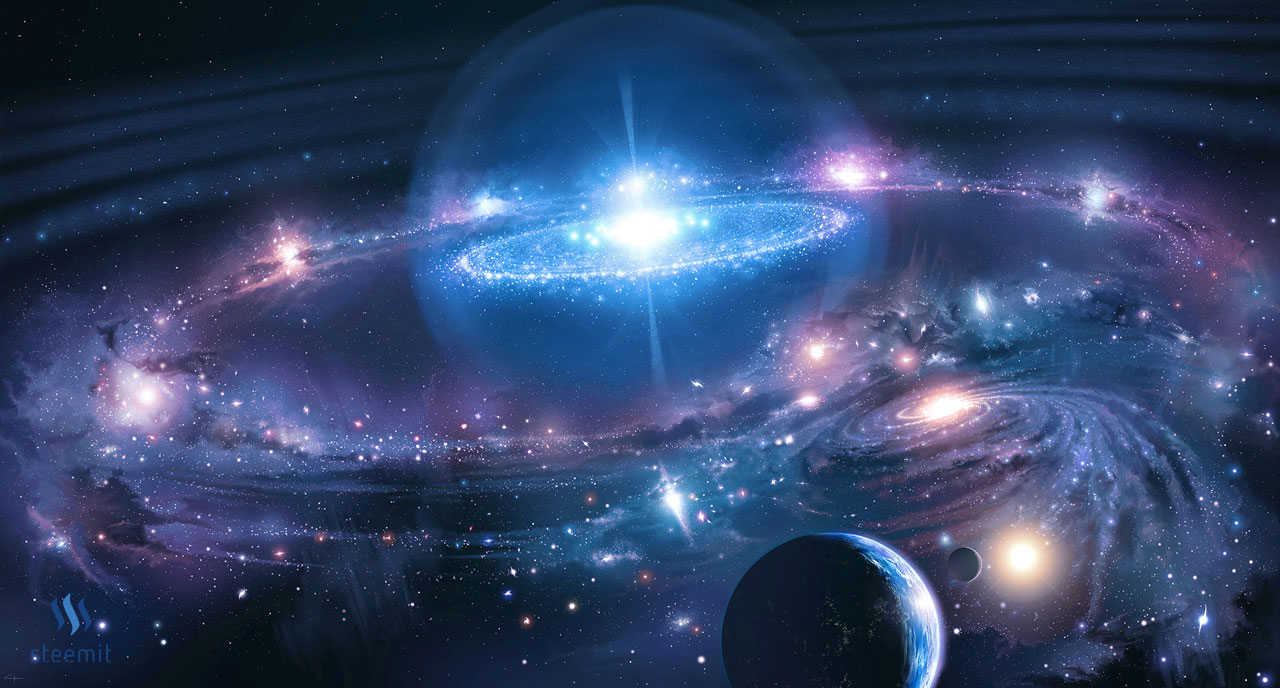
Wikipedia defines it as,
“everything that exists, everything that has existed, and everything that will exist”
The early man was mesmerized by the view of the night sky full of uncountable stars and the moon, as we see even today. But the only difference is that, at that time the early man had no idea of what that was, but today we have a little bit of idea and understanding of the things we see in the sky.
Ancient Indian philosophy [Rigveda -1500 to 1200 BC] describes the whole universe as a “cosmic-egg” or Brahmanda which goes through a cyclical process of creation, destruction and rebirth. It suggests that the whole universe or Brahmanda expands out of a single concentrated point called a Bindu before subsequently collapsing again after every 4,320,000 years. [1]
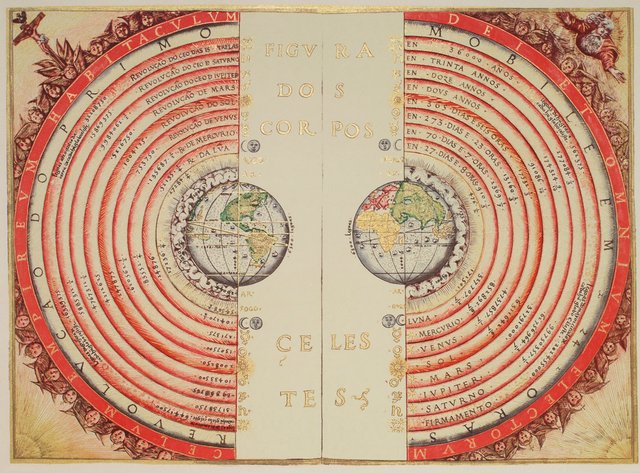
An illustration of the geocentric universe by Portuguese cosmographer Bartolomeu Velho, 1568 | Wikipedia
The Greek philosopher, Aristotle in the 4th century BC, suggested a universe with the spherical Earth at its center surrounded by all the celestial objects around it. He believed in a finite and static universe which existed since infinite time, unchanged. Aristotle also argued that the universe is made up of five elements out of which four are the previously established classical elements: Fire, Water, Air and Earth and the fifth one added by him: Aether (which fills the void of the universe). [2]
Humans are trying to decipher the secrets of this splendid universe since time immemorial. Yet we are not able to understand it completely. But the physicists are not ready to give up. As Einstein said in his book Physics and Reality (1936),
“The most incomprehensible thing about the universe is that it is comprehensible.”
This gives them motivation and different theories have been proposed about the existence and origin of the universe.
Some physicists believe in an eternal and infinite universe while others believe in an infinite universe which actually had an origin. There is yet another cult of physicists who believe in a finite universe. Different physicists have a different say about the universe.
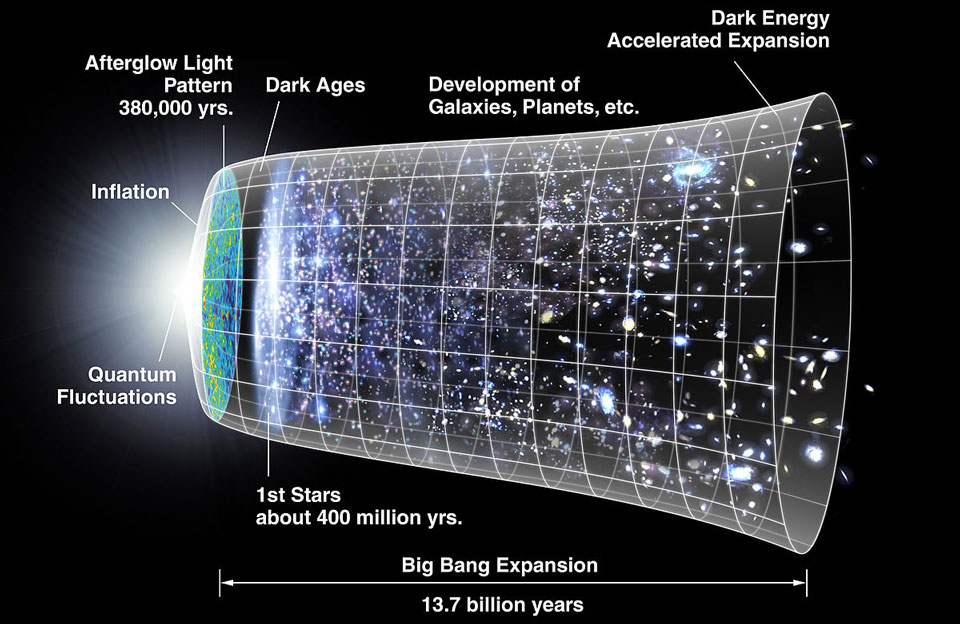
Timeline of the metric expansion of space starting from Big Bang | Wikipedia
But presently the most accepted theory is the Big Bang Theory, which supports the view that the universe is infinite (with infinite space) and yet it's expanding. If we reverse the process, we get a single point of infinite density called “the singularity”. So, it suggests that everything exploded out of a single point 13.8 billion years ago which is considered as the age of the universe. [3]
However, there are many inconsistencies in this theory also, like if anything had an origin then it must have an end, but it says that universe is infinite. Another problem is that why there is more matter than antimatter (Baryon Assymetry).
Yet there is another simpler problem: What is the shape and structure of the universe and how big is it?
Structure of the Universe
Almost everything that we see in the night sky is a part of our galaxy (Milky Way) because they are the closest (and thus brightest) objects to the Earth.
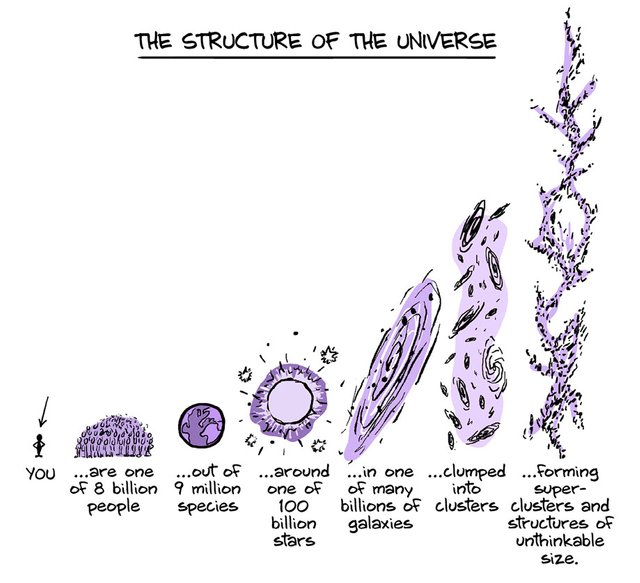
Hierarchy of the universe | Book: We Have No Idea
The universe consists of innumerable celestial bodies out of which our home, the Earth is one. This third planet of our solar system and other seven planets revolve around the Sun, as it orbits the center of our galaxy which is a huge spiral disc with several arms swirling out from a bright central hub. There are about 100 billion stars in our Galaxy out of which our Sun is one.
Our universe is mostly dotted with innumerable galaxies and there is no evidence of lone stars floating between galaxies. Previously it was believed that stars were evenly sprinkled throughout space, until we built a telescope powerful enough to observe that stars clustered together to form a galaxy. And out of those billions and billions of galaxies our Milky Way is one. So you may be feeling that how unimportant we are in this universe!
Don't hurry, there is even a bigger picture I want to show you. Just hold your seat.
The recent observations show that even the galaxies are not evenly distributed throughout the universe, they tend to clump together to form loose groups and clusters. These clusters again group together to form massive superclusters each with dozens of clusters.
As we see that the structure of the universe is very hierarchial up to the size of galactic superclusters and follows a pattern. Moons orbit planets, planets orbit stars, stars orbit the centre of their galaxies, galaxies move around the centre of their clusters, and the clusters zoom around the centre of superclusters.
The peculiar thing happens after that; superclusters don't form megaclusters or superduperclusters. But instead they do something much more surprising: they form sheets and filaments. These sheets of superclusters are impossibly vast structures, hundreds of billions of light years across, tens of billions of light years thin and infinitely long.
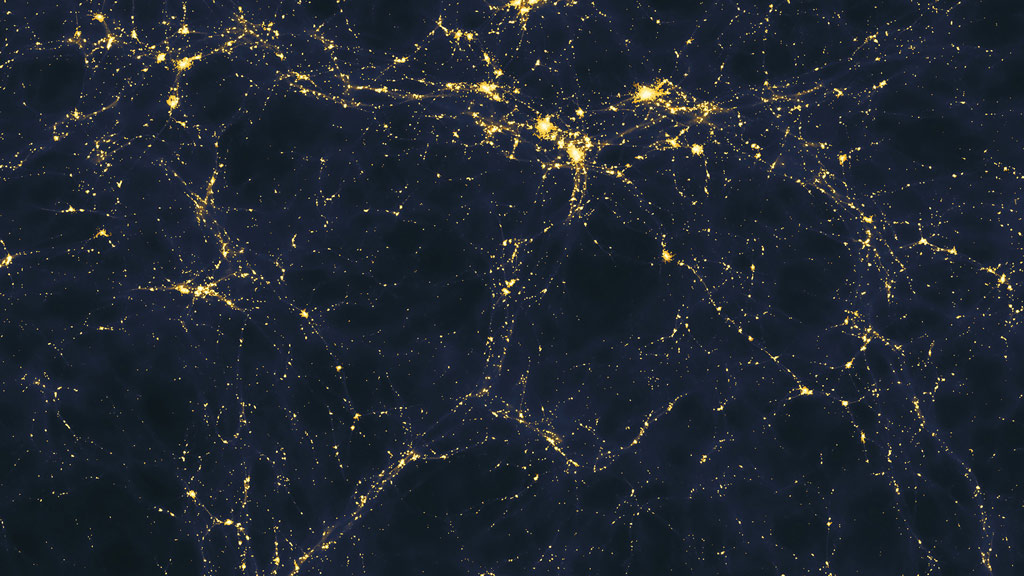
A computer-simulated image depicting large scale arbitrary structure after superclusters | PBS
The formation of superclusters is probably the largest known structure in the universe. If we continue to zoom out, we will find a repeating pattern of stars-galaxies-clusters-superclusters-sheets everywhere. But no larger scale structure is formed.
However, one thing is clear from this, now you can speculate how unimportant we are. Although it remains to find out whether it’s unusual when it comes to life and intelligence.
Now let's return to the agenda. Why do we have this structure at all? Why are stars not evenly distributed throughout the universe like dust particles floating in an old room?
If the universe were infinite and smooth, then every particle would have been equidistant from each other and would have experienced equal gravitational pull. In that case none of the particles could move in any direction and thus the universe would have been still.
And if the universe were smooth and finite then every particle would have been attracted towards the same point i.e. the center of mass of the universe. Hence they would clump together to the same point and the rest of the universe would have been empty space.
In either of the case we do not get any local group or structure of particles as we actually see in our universe. However, physicists have some nice theory explaining why we have a universe full of structure.
At the beginning, the universe was smooth and hot but had some quantum fluctuations and with the rapid expansion of space, these small fluctuations formed large wrinkles which seeded the formation of stars and galaxies with the result of gravity. And that was aided by dark matter and even dark energy made its way to start stretching out space even farther.
So in simple words, it can be said that space expanded so rapidly that gravity didn't get time to clump the particles together and thus resulted in the formation of different local structures. This may also explain why we don't have any megacluster or superdupercluster. Probably there just hasn't been enough time for gravity to pull things together to form bigger structures than superclusters.
Now you may have got some idea about the vastness of the universe. But how big is it? Is there any limit?
Size of the Universe
Even though we have lots of information about the structure of the universe but we don't know its limits. We don't know how big it is out there. Light brings us beautiful pictures of the different parts of the universe, but it had only 13.8 billion years to do it (age of the universe). Which means that anything beyond that is invisible to us. But this is not fully true, actually space itself can expand faster than light (and has done it in past), so it adds up to the size of the visible universe: 46.5 billion light years in every direction. Whatever picture we see through the telescope, we actually see the past and if we see 46.5 billion light-years we will actually be seeing the origin or the picture of the infant universe. But still we shall never be able to see what's beyond that horizon at present.

Size of the observable universe | Book: We Have No Idea
Every year an extra visibility of one light year gets added to the observable universe but in the meantime space is also expanding at a rapid pace so, probably our observable universe may never be able to catch up to the actual universe.
As we cannot actually observe the limits of the universe, anything cannot be clearly stated. However, some logical assumptions can definitely be made:
A finite Universe in infinite space

The strangeness of infinity | Book: We Have No Idea
It may be possible that the universe is finite in size but have grown so large (due to expansion of space) that we cannot observe it as a whole in infinite space.
Before the inflation the size of the universe was speed of light times the age of the universe, since space had not yet done any expansion or stretching.
Now taking into account all the stretching that took place later on and gradual expansion of space (due to dark energy) which is still going on we get a universe of unthinkable size even if it is finite.
So even if we accept the unjustified assumption that universe is finite, we still don't know how big it is.
A finite Universe in finite space
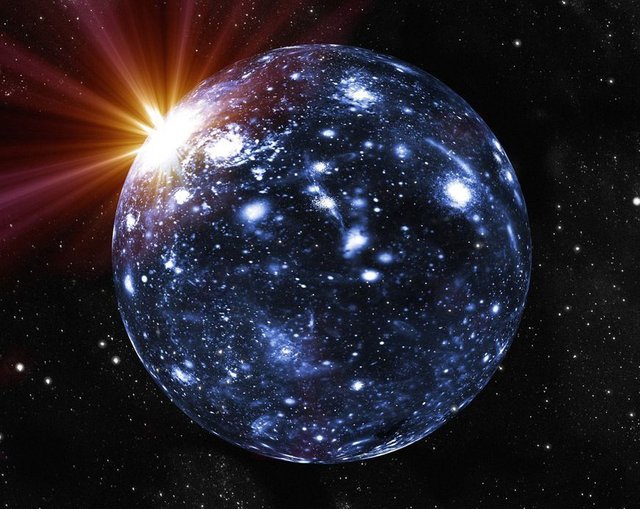
An illustration of finite spherical universe in the 4th-Dimension
A finite universe is okay, but how can we imagine a finite space. So, to assume that we first need to assume that space is curved. Which means that the universe is curved and the space is like a surface of a sphere in 4th or more dimension. In that case we'll find a finite space, just like the finite space on Earth's surface. In that situation everything would loop around in such a universe, like if you start travelling in one direction, it would eventually lead you back where you started (just like what happens on Earth).
In that mind-bending scenario, light travelling through such a universe would also loop around and might pass by Earth more than once. If that happens then we could easily observe it: we would find multiple images of same object, once for each time the light loops around. And then we might see multiple moons and stars (the same one like Pole Star) at the same time.
Unfortunately, that doesn't happen in our universe. Scientists tried hard and observed the farthest galaxies to find any evidence of that but didn't find any.
Maybe universe and space is not finite or it is so big that even light has not been able to complete its first loop.
An infinite universe
It may be totally possible that space is infinite with infinite amount of matter and energy. This is a brain-twisting possibility as the concept of infinity is itself very much strange. In an infinite universe, the possibility of anything to happen is infinite. So anything we imagine to happen maybe happening somewhere in the universe (no matter how unlikely unless the probability isn't zero). In an infinite universe, there may be a same person like you who is a billionaire. There may be a planet like Earth in which Steem is more powerful than Bitcoin. So there are infinite possibilities for anything to happen, not only once, but infinite number of times.
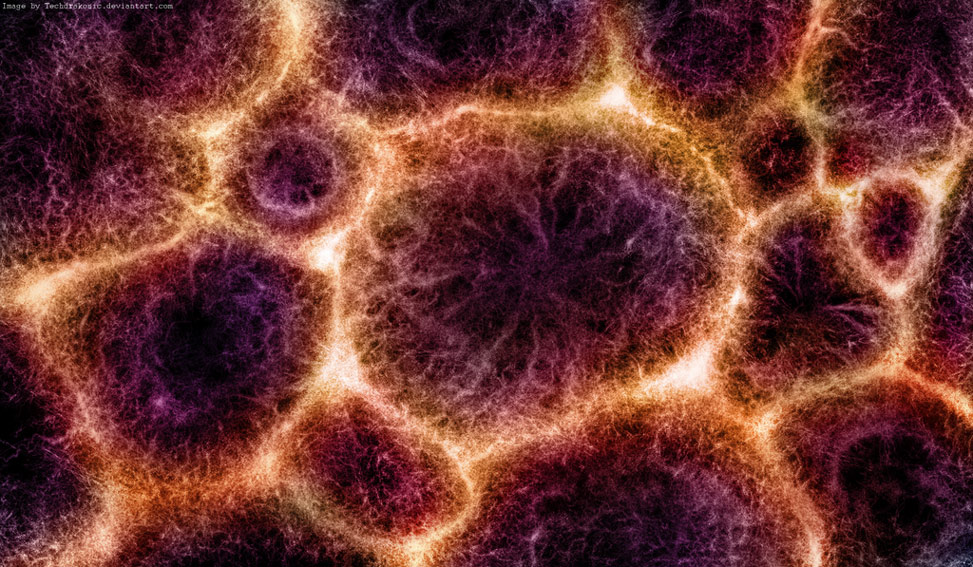
A depiction of simultaneous multiple Big Bangs by Techdrakonic | Deviant Art
But how can an infinite universe be any logical as compared to what we see? Can a universe which is infinite be expanded from a Big Bang?
Yes, but only if Big Bang happened not only at one point but everywhere at the same time.
Conclusion
So we saw that the size of the universe is really incomprehensible. But still we are trying through our observations to predict its structure and shape. We have different scenarios for the universe: finite matter in infinite space, finite matter infinite space, infinite matter in infinite space, but we really don't know which is our reality.
Physicist even tried to find the shape of the universe by calculating the curvature of space-time which depends on the density of matter throughout the universe.
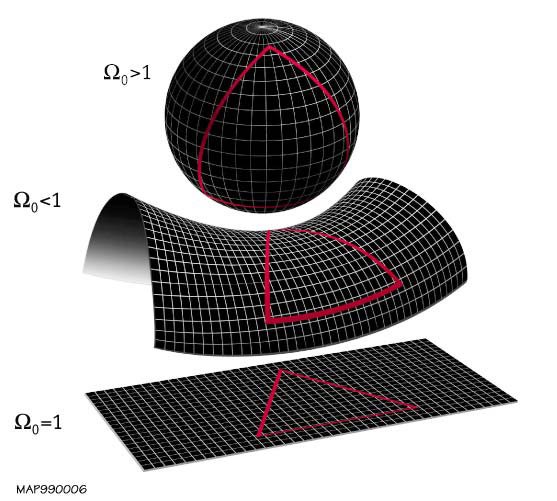
The shape of the universe is determined by whether the density parameter Ω is greater than, less than, or equal to 1 | Wikimedia
They found through the observations and geometrical calculations that universe is mostly “Flat”. [4]
Now it also supports the theory of infinite universe as we have discussed before.
But it is really strange that we have just the right amount of matter in this universe to make it flat, if we had little more matter than it would have been positively curved, and if it had a little less then it would have been negatively curved.
Whatever it may be, one thing is final, that you are a billionaire somewhere in the universe, if it is infinite!
Image Source: Pexels | Google Public Domain Images
So, which theory will you support for the Universe? Do you believe in infinite? Is there a huge cosmic whale as big as a supercluster beyond our observable universe? Do share your ideas and views through your comments. Your feedback is important for me.
References
[1] - Thompson, Richard L. (2007). The Cosmology of the Bhagavata Purana: Mysteries of the Sacred Universe
[2] - Physics of the Universe : Cosmological Theories Through History
[3] - Wikipedia : Big Bang
[4] - Wikipedia : Shape of the Universe
Bibliography - Jorge Cham and Daniel Whiteson (2017) : We Have No Idea
Great post! I have a single remark. Actually, nothing is going faster than light, but if you exchange information (at the speed of light) modula the fact that the universe is expanding, you will have the impression that it expands faster than light.
PS: I didn't know Jorge Cham and Daniel Whiteson wrote a book :)
Yeah, the space once expanded even faster than light at the time of Big Bang (if the theory is correct).
But now it has probably slowed down and is expanding due to dark energy.
And yes We Have No Idea is a great book and provides some food to this curious mind. :D :p
That is not correct: nothing goes faster than light. That is the golden rule. That is also what the big bang theory says. What we see is an effective speed that contains two component: information (or light) travel and expansion. As a result, we have the impression that it expands faster than light.
The Speed of Light is not what you think it is, im actually gonna make a post on this :D thanks for the inspiration :)
Well, the speed of light is a very well defined quantity. How could it be differently?
Yes it is, but beyond this dimension it isn't. Light itself takes on different qualities as it breaks through dimensions. and even realities.
You can't think of light as an object its consciousness it changes and it addapts to the circumstances.
That is not correct. The speed of light stays the speed of light in any higher-dimensional model I know of.
Not what I experienced when entering higher dimensional fields. It changes constantly.
infinity endless ..............
Yeah, infinity is endless. :P
Excellent post :)
Thanks bro. :)
The size of the universe is beyond comprehension. Great post thanks for sharing
Thanks bro. Yeah, the Universe has an unimaginable size.
@nitesh9 I am glad you're putting this up here.
Thanks bro. :)
Great post thanks for sharing!!
My perspective: The universe is infinite; this means that there is not only infinite volume but also infinite mass filling that volume having an infinite variety, from infinitesimal through infinite in relative mass.
What this means is that there is no where beyond the mass where there is volume but not mass because there is already mass everywhere. As a result, mass doesn't just flow outward into those "empty" zones, filling the infinite empty space and reducing the universe to nothingness. It is able to stay stable with mass everywhere because there is mass everywhere. This holds it all in a general balanced equilibrium that allows for larger and larger structures to exist. Each larger structure forms a generally galactic structure of smaller masses around it, producing an endlessly larger but always generally "flat" structure such as the disc of a galaxy or the belts and planets of a solar system, which leads to us seeing it as flat.
At some point, the disc is so large that we--having limitations in how far our technology can see into this infinite space--no longer see these larger and larger structures. Also, gravitational lensing influences how we see the universe which plays a critical role in producing the interweaving web of superfilaments. Optical illusions begin to play a large part in how we see and position in 3-dimensional coordinates the physical location of systems, which leads us from being able to appreciate the disc structure of larger and larger systems since we are not accounting for gravitational lensing on such a large scale because we do not account for infinity in our current models.
So, you believe in infinite probability theory? :D
That basically every circumstance that could exist does exist infinitely? If so, I'd say yes that seems likely, given that the universe is infinite :D
Very interesting to learn that the universe may be expanding faster than the speed of light. I often think about the fact that if we were to be able to travel faster than the speed of light, and then create an extremely powerful telescope and point it at earth, we would be able to observe events that happened in the past. Like what happened to the dinosaurs or who assassinated JFK!
Love this post. Liked and followed! And I am doing a similar type of series on chemistry if you'd like to check it out!
To view the past of the earth with dinosaurs, we must at least go 150 millon light years away from the earth at the present instant. Which is probably not possible at present.
But maybe if the research of worm-hole gets successful, then we'll be able to do that in future.
And yes, I am already familiar with your chemistry posts. You're really doing an amazingly innovative work.
Kinda make you feel like nothing when you think about how big the universe is doesnt it?
Yeah, in respect to the universe we are nothing more than an electron or neutrino particle. :D
What an amazing article and so many hours you must have spent with it !
Not hours, but days. Total 5 days. ;)
I had a zillion of hours in my mind ! I know I know!!! Great work!
Ha ha. Thanks.
Simple its a Universe which means
UNI: One
Verse: Song
One Song
One Expression of Creation.
So it has a Finite Existence but it is Infinite unto itself.
Because everything within this universe has an infinity.
Thus this Universe is already as big (if you wanna call it that) as it can be
But is growing Infinitely larger within its finite expression.
The fact that science hasn't figured this out yet shows how dumb scientists are and to even speculate on the shape is just insane we cannot possibly know that.
If i had to make a guess i would say its a toroid field like shape because thats the only way how infinity is born and yet the construct remains the same.
Thats also why in every black hole its connected to another parallel universe.
Its all Infinite within an Finite Expression.
What an idea UNI + VERSE = Universe.
But if you say the Universe has a shape (toroid), that moment only it becomes finite. The concept of inifinity is very vast and important thing is that it has no shape.
You need to understand that it's not this and that, it's this and that, Infinity contains all possible outcomes
So it could be shapeless and have form at the same time.
But, providing a shape to something gives it boundaries and thus sets limits.
But as said anything is possible because everything is based on observation and current knowledge. Once Earth was considered flat, but later we got to know that it is round, even later on it was discovered that it is not fully round, it's oblate ellipsoid.
And yes multiple possibilities are possible if we consider multiverse theory to be true.
I actually provided proof of multiverse theory by simple understanding how time works. so of course it is true.
Life fascinates me :)